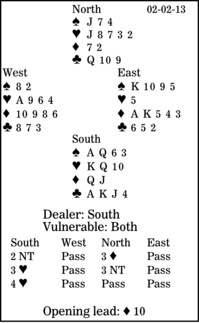Bridge column, February 2: Judge the skill of your opponents

Sun Tzu, an ancient Chinese general and strategist, wrote, "To win 100 victories in 100 battles is not the acme of skill. To subdue the enemy without fighting is the acme of skill."
At the bridge table, sometimes your judgment of the opponents' skill will influence your play -- as in this deal. South is in four hearts. West leads the diamond 10. East takes the first two tricks in the suit, then shifts to the club six. Declarer wins on the board and plays a trump to his king. West takes the trick and returns a diamond. How should South continue?
North's transfer bid followed by three no-trump showed five hearts and game values.
South starts with three top losers and only nine winners (one spade, four hearts and four clubs). He seems to need the spade finesse to work. However, after West's diamond lead at trick five, if hearts are splitting 3-2, declarer could discard a spade from the dummy, ruff in his hand, cash his last trump, cross to dummy with a club, draw trumps and claim. Note, though, that this fails here because West gains a second trump trick.
If West is a beginner, South must guess what to do. But if East and West are experts, West cannot have the spade king. If he did, he would have dropped the diamond nine at trick two as a suit-preference signal and East would have shifted to spades, subduing the contract.
West's defense strongly suggests that hearts are 4-1. Declarer should ruff on the board, cash his two top hearts, return to dummy with a club, draw the last trump, and take the spade finesse.
** ** **
COPYRIGHT: 2013, UNITED FEATURE SYNDICATE
DISTRIBUTED BY UNIVERSAL UCLICK FOR UFS

